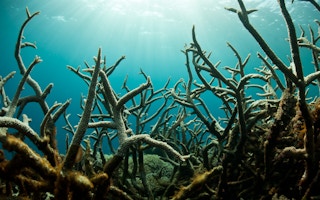Ocean acidity is likely to more than double by 2100 because of fossil-fuel pollution, putting fisheries at risk and diminishing the capacity of the seas to absorb carbon-dioxide emissions, a study showed.
The seas have already acidified by 26 percent since industrialization began two centuries ago, and a continuation of current trends may lead to a 170 percent increase in acid levels by the end of the century, according to the study released at the United Nations climate talks today in Warsaw.
A study earlier this year showed oceans — which absorb CO2 from the atmosphere, forming carbonic acid — are acidifying at their fastest pace in 300 million years. Because the level of acidity can affect the ability of creatures to form shells, the resulting damage could cost the shellfish industry $130 billion a year, according to today’s Unesco study.
“Substantial changes in marine ecosystems are expected and they are likely to have a major socioeconomic impact,” the United Nations Educational, Scientific and Cultural Organization said in a statement. “This phenomenon is all the more worrying in view of other threats to marine ecosystems such as rising water temperatures, overfishing and pollution.”
Negotiators in the Polish capital are working to craft by 2015 a treaty to limit from 2020 the carbon emissions that cause both global warming and ocean acidification.
Ocean’s role
The oceans absorb about a quarter of CO2 emissions from human activity, according to the researchers. As its acidity increases, its ability to absorb the gas diminishes, threatening to heighten global warming because more heat-trapping CO2 will remain in the atmosphere, they said.
“If we don’t do something about it and we follow a high CO2 scenario, we will see both global warming and the acidification of the oceans,” Carol Turley, a senior scientist at the Plymouth Marine Laboratory in southwest England, said today in Warsaw.
The study was compiled by Unesco’s Intergovernmental Oceanographic Commission, the Scientific Committee on Ocean Research and the International Geosphere-Biosphere Program. It represents the conclusions of 540 ocean scientists from 37 nations.

















